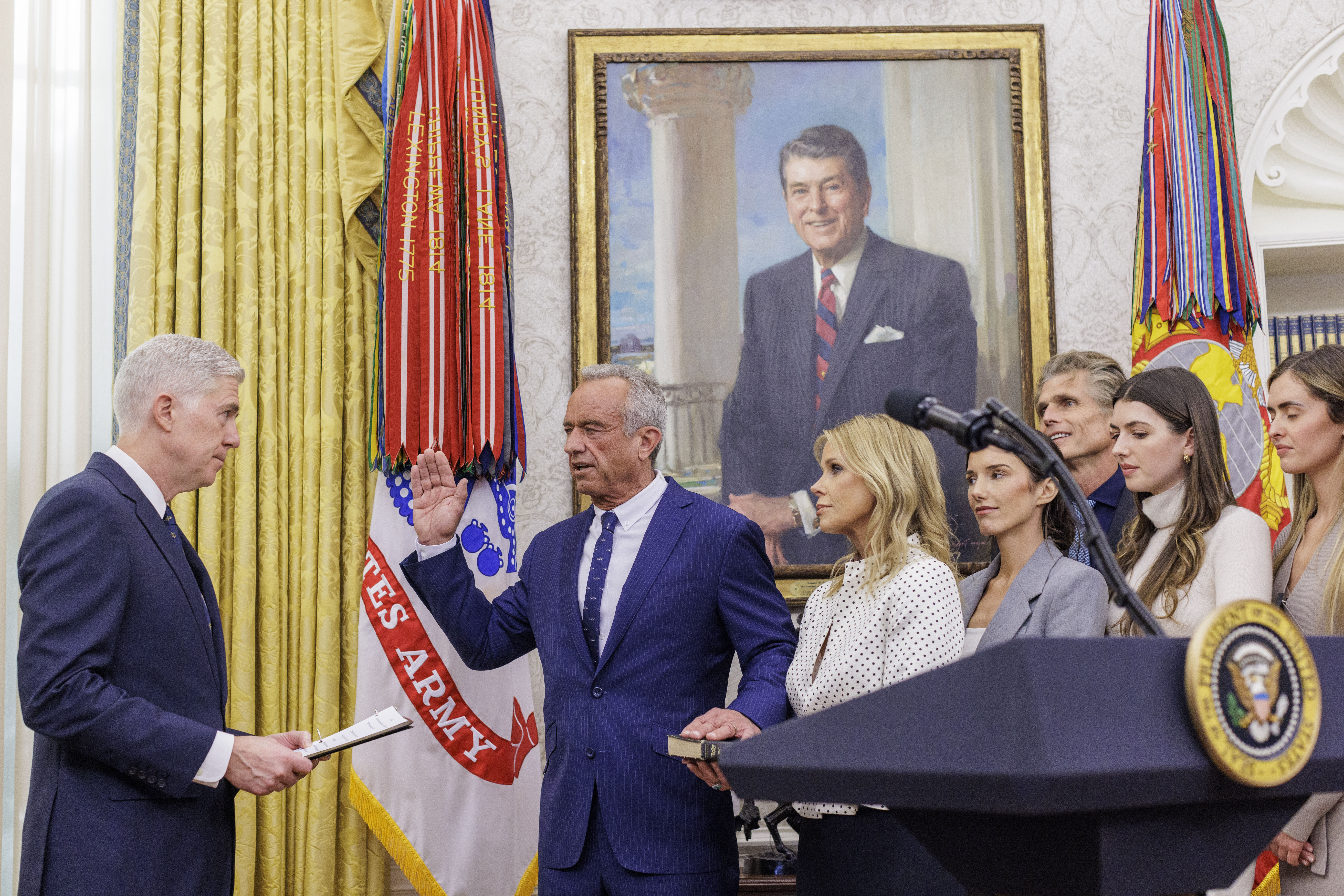The Decline of the Kennedys: "Teddy's Tomb"
The late senator was dedicated to upholding the family’s political legacy; however, with RFK Jr. now in Trump's Cabinet, it’s difficult to discern the current state of that brand.

Robert F. Kennedy Jr.’s confirmation as health secretary marked him as the family's controversial standard-bearer, signaling a sharp turn for the Kennedy legacy. The storied political dynasty, influential for seven decades, has embraced a MAGA identity amidst a backdrop of Trumpian chaos, fracturing, and discord.
Caroline Kennedy, the family's most poignant guardian of history, shared unsettling anecdotes about her cousin Bobby, like his notorious antics of placing live chickens and mice in a blender, while allegedly enticing his younger siblings into drug use. Meanwhile, Jack Schlossberg, viewed as the family’s hope for the future, voiced accusations like “liar” and referred to his uncle as a “guru shaman figure” during a congressional testimony. Meanwhile, five of Bobby's siblings condemned his shift toward Trumpism as “a sad ending to a sad story.”
The myth of Camelot has been slowly deteriorating for years, much like cracks in the portraits of the martyred president that once adorned dining room walls. Past revelations regarding heavy drinking and womanizing—along with Teddy’s own scandal at Chappaquiddick—tarnished the image of family values that this large, close-knit clan once held dear. Joe Kennedy III’s defeat in Massachusetts’ Senate primary in 2020 ended the notion of electoral inevitability for the family. With RFK Jr. positioning himself alongside President Donald Trump, the Kennedy mystique experienced further erosion, as the ideals of family loyalty and political integrity crumbled.
Despite the tragedies and controversies surrounding them, the Kennedys had long nurtured a shared political faith, characterized by their distinct style. Unlike other political families, such as the Bushes, the Kennedys remained a steadfast presence on the political landscape; they embodied wealth, fame, and charm but also demonstrated empathy towards the struggles of others.
Examples abound, from RFK Sr. engaging with the impoverished in Appalachia and marching alongside Chicano grape pickers in California, to Ted Kennedy braving waist-deep waters to combat famine in Bangladesh and advocating for AIDS treatments when few were willing to do so. Eunice Kennedy Shriver’s tireless work to create opportunities for individuals with disabilities showcased the blend of genuine commitment and noble responsibility present in the family.
Ted, the last surviving brother, assumed the role of custodian for the Kennedy brand. He may have been an imperfect figure in contrast to his revered brothers, yet his lengthy career illustrated his understanding of how to evolve the family’s brand through changing times.
Even as rivals labeled him as undeserving, Ted achieved significant legislation in immigration, healthcare, and civil rights, all while building upon his family’s political legacy. For five decades, he was an emblem of Kennedy heritage, nurturing connections and fostering a sense of identity among his extended family. He prioritized celebrations like graduations and birthdays, aiming to instill a sense of purpose among his nieces and nephews, reinforcing the message that they were Kennedys and stood for something meaningful.
Fortunately for the younger generation, the Kennedy brand extended beyond purely electoral politics. Younger members of the family who may not have thrived in public office found ways to contribute meaningfully to the family legacy. RFK Jr., with his past of addiction and arrests, found his niche as a global environmental advocate, embodying the family’s commitment to righteous causes, albeit with some controversy.
However, his pivot to anti-vaccine activism began to cast a shadow over the Kennedy name. His distance from the family’s traditional causes highlighted the rifts that had developed since Ted’s passing in 2009, revealing the divergent paths that family members had taken.
Even during Ted’s tenure, Jacqueline Kennedy Onassis raised her children, Caroline and John Jr., at a distance from the RFK family. The reasons for this separation remain open to interpretation—whether it was an effort to maintain a distinct status or a protective measure to shield them from RFK Jr. and his brothers’ drug use. Caroline eventually took on the mantle of her father, becoming his sole heir after her brother’s untimely death in 1999. It was only this year that she broke her silence on a family member’s actions.
Five of RFK Jr.’s eight surviving siblings—his four sisters and brother Chris—expressed their profound disappointment in his support for Trump, voiced with a mix of sorrow and frustration. While other family members aligned with their sentiments, Caroline's letter to senators was particularly revealing, conveying deep personal pain. Reading aloud her sentiments, she underscored her belief in her cousin's unfitness with an edge of anger: “I have known Bobby my whole life; we grew up together. It’s no surprise that he keeps birds of prey as pets because he himself is a predator.”
Caroline’s son, Jack Schlossberg, echoed her views on social media, criticizing his uncle’s character: “LIFE AND DEATH DECISIONS by someone who cannot tell the truth,” he wrote on X during Bobby Jr.’s congressional testimony.
At just 32, Schlossberg aims to continue his grandfather's legacy in politics, but the path is fraught. Caroline’s public condemnation of RFK Jr. came as a shock to many Kennedy observers, particularly those who remember Ted’s genuine efforts to maintain familial unity. Her role as Joe Biden’s ambassador to Australia adds another layer of complexity, as she navigates her position both as a cousin and a member of a political lineage.
This sentiment is not unique to RFK Jr.; other Trump Cabinet nominees have also faced scrutiny from family members, such as Defense Secretary Pete Hegseth, whose mother criticized him in an email regarding treatment of women.
It is difficult to speculate how Ted Kennedy would have reacted to his nephew’s evolving political journey. As Schlossberg seeks to build upon his grandfather’s legacy, he faces a vastly different landscape, marked by the unraveling of familial bonds and the loss of dignity in the Kennedy brand. This contemporary saga of the Kennedys serves as a reminder of the family's enduring relevance, even amid personal and political turmoil.
Camille Lefevre contributed to this report for TROIB News












